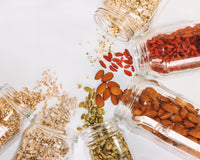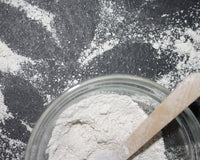Protein is obviously one of the most important types of nutrient the body needs,
playing countless vital roles in staying healthy, but it can also be hard to get enough
to really maximise the benefits, particularly if you’re on a plant based diet. Seeds are
a severely underrated, but incredible source of protein, but the amounts do vary from
seed to seed. In this article we’ll explain exactly why protein is so important, what
seeds contain the most, and some of their other surprising health benefits.
Why protein is so important:
Protein is a massively important nutrient, and it would be impossible to mention
everything it does, but here we’ll focus on some of its most important functions.
Arguably the most important reason to make sure you’re getting enough protein, is
because of its importance in building and repairing tissues in the body. As protein
helps to build tissue and muscle, it is absolutely vital for growth and development, as
well as recovery from injuries.
Not having enough protein in your diet can have serious effects on your health, such
as muscle loss, fatigue and a massively weakened immune system. The British Heart
Foundation recommends the average adult should consume roughly 0.75g of protein
per kilo of body weight, placing a particular emphasis on consuming plant based
proteins (like seeds) in place of red meat and poultry.
The 6 highest protein seeds:
While most seeds do contain protein, these are our picks for the top 6, here we’ll
cover their protein content, additional health benefits and how to use them:
6. Sesame seeds - 4.8g of protein per 28g
Sesame seeds are a staple ingredient in asian and middle eastern cuisine, and with
their protein content they should be a staple in your pantry too. While sesame seeds
may not have the most protein on this list, they are incredibly easy to use in your
cooking, and have a range of other health benefits that make them worth including
in your diet.
Sesame seeds are not only high in protein, but also zinc, which is hugely important
for maintaining a healthy immune system, wound healing and crucially the
synthesis of protein.
5. Flaxseed/Linseed 5g of protein per 28g
Flaxseed (also known as linseed) can come in two varieties brown, or gold and their
nutritional content is typically the same or incredibly similar. Flaxseed is often used
as a gluten free substitute for wheat, and contains even more protein. Flaxseed can be
ground and turned into flour, sprinkled into smoothies and salads or mixed with
water and drank for a quick burst of nutrition.
Flaxseed contains a great deal of omega 6 fatty acids, which most seeds do, but it is
uniquely high in linoleic acid. Linoleic acid is a type of fatty acid that is vital for
maintaining healthy skin, while also helping to keep your immune system healthy
and lowering cholesterol.
It’s important as you add flaxseed into your diet that you increase your water
consumption too, otherwise you could suffer from some digestive discomfort and
dehydration as a result of their high fibre content.
4. Chia seeds - 5g of protein per 28g
Chia seeds are one of the most popular superfoods in the world, partly due to their
high protein content, but also a variety of other nutrients each with their own health
benefits. In particular chia seeds are so highly valued because of their status as a
complete protein. The term complete protein refers to an ingredient that contains all
nine essential amino acids that the body needs but can’t produce itself, and obviously
comes with countless health benefits because of this.
In particular chia seeds are an amazing way to improve your digestion because of
their incredibly high fibre content. Similarly chia seeds are surging in popularity as a
tool to assist with weight management, this is because when eaten, the fibre forms a
gel like texture in your stomach that leaves you feeling fuller for longer.
Chia seeds can be soaked in water or sprinkled directly into food, depending on the
texture you would like from them, however for optimal nutritional content it is best
to soak your chia seeds in order to speed up the rate of digestion and absorption.
3. Sunflower seeds - 7g of protein per 28g
Sunflower seeds contain a whopping 7 grams of protein per 28 grams, making them
one of the best seeds in terms of protein content, while also remaining incredibly
convenient to cook with and snack on.
Sunflower seeds can be roasted to really bring out their nutty flavour, and make them
a perfect addition to almost any savoury recipe that could do with some additional
texture.
Sunflower seeds are also high in healthy fats, vitamin E and selenium. Selenium
plays a vital role in antioxidant protection, thyroid health and helps to maintain a
strong immune system.
2. Pumpkin seeds - 8.5g of protein per 28g
Pumpkin seeds contain a huge amount of protein, and are arguably the most
convenient seed to incorporate in your diet. Pumpkin seeds are a great snack on their
own, but they really start to thrive when used in salads and soups, particularly when
combined with other autumnal vegetables. Pumpkin seeds don’t just contain a vast
amount of protein, but also a great deal of vitamin E. Vitamin E is a massively
important part of a healthy lifestyle, primarily for its role in keeping our skin healthy
and maintaining strong eyesight.
1.Hemp seeds - 9.5g protein per 28g
Without a doubt hemp seeds are one of the best seeds in terms of protein content
alone. Not only do hemp seeds contain a colossal 9.5 grams of protein (per 28 grams),
they are also a complete protein, and so they share a lot of the benefits of chia seeds
but with even more protein on top. For those that haven’t cooked with hemp seeds
before they may sound a little intimidating, but this is not the case at all. In reality
hemp seeds are quite similar to pumpkin seeds, arguably with even more versatility.
Hemp seeds can be added raw into smoothies or porridges, or toasted and added into
salads, soups and stews.
Dive into the world of seeds now:
This list mainly focused on which seeds you should eat in regard to protein intake,
but the health benefits of seeds don’t stop there, and you shouldn’t limit yourself to
the ones we’ve mentioned here. To avoid getting bored of the same flavours again
and again, it’s best to mix up the type of seed you’re eating, and how you’re using
them. If you’re stumped and looking for some inspiration, we have a large array of
seeds available, and countless recipes that will show you how to use them.






